Qi OIL MHz+ 25% Full Spectrum
R1,950
Bio-Frequency Essential Oil
Product of Italy.
20ml Dropper Pipette
Qi Oil MHz+ 25% Full Spectrum
Our organism is faced with a momentous ordeal as it is forced to adapt to electromagnetic frequencies of such magnitude that they can pollute and alter our cellular communication balances. If our cellular communication is altered, disharmonies initially emerge in our system, which can become imbalances that can, in turn, turn into real dysfunctions and pathologies over time.
By exploiting the properties of the oils (which are able to penetrate deeply and remain in the tissues), bio-frequencies (appropriately programmed using sophisticated equipment) transmit specific information through the epidermis to resolve a specific imbalance.
Qi Oil MHz+, is a line of essential oils aimed at rebalancing and regenerating the body’s cells to communicate better and regain their natural balance.
Qi Oil MHz+, Frequency treated Hemp (Sativa L.) oil 25% Full Spectrum.
Cannabidiol CBD is a naturally occurring compound found in the resinous flower of cannabis, a plant with a rich history as a medicine dating back thousands of years. Today, the therapeutic properties of CBD are being tested and confirmed by scientists and doctors around the world. A safe and non-addictive substance, CBD is one of over one hundred phytocannabinoids that are unique to cannabis and give the plant its robust therapeutic profile. CBD is closely related to another important active medicinal phytocannabinoid, the tetrahydrocannabinol THC, the compound that causes the high for which cannabis is famous. But unlike THC, CBD does not make a person feel “or drunk.” This is because CBD and THC act in different ways on different receptors in the brain and body.
CBD can actually reduce or neutralise the psychoactive effects of THC depending on how much of each compound is consumed. Many people want the health benefits of cannabis without the high or with a lower high. The fact that CBD is therapeutically potent, non-intoxicating and easy to take as CBD oil makes it an attractive treatment option for those who are cautious about trying cannabis for the first time.
CBD THE MULTI-PURPOSE MOLECULE
- Autoimmune diseases (inflammation, rheumatoid arthritis);
- Neurological conditions (Alzheimer’s, dementia, Parkinson’s, multiple sclerosis, epilepsy, Huntington’s chorea, traumatic brain injury);
- Metabolic syndrome (diabetes, obesity);
- Neuropsychiatric diseases (autism ADHD, PTSD, alcoholism);
- Intestinal disorders (colitis, Crohn’s disease);
- Cardiovascular dysfunction (atherosclerosis, arrhythmia); Skin diseases (acne dermatitis, psoriasis).
HOW DOES CBD WORK?
BENEFITS OF QI OIL MHZ+ CBD
WHAT FULL SPECTRUM CBD MEANS
Full spectrum CBD is derived from hemp and contains many cannabinoids in addition to CBD alone, including THC, along with other elements of the hemp plant, including natural terpenes, essential vitamins, fatty acids, proteins and more. There are more than 100 compounds known as cannabinoids in the cannabis plant, one being of course cannabidiol (Other common cannabinoids you may encounter are):
Cannabichromene (CBC) anti-inflammatory, antidepressant, antifungal and anticancer properties.
Cannabidivarin (CBDV) has anti-convulsive, anti-inflammatory and anti-nausea properties, as well as its impact on pain and mood disorders. It is particularly effective in providing relief from the symptoms of Crohn’s disease, HIV/AIDS and MS.
Cannabigerol (CBG) anti-inflammatory, antifungal and anti-cancer properties CBG has shown positive effects for cancer, glaucoma, inflammation and skin diseases.
Cannabinol (CBN) sedative effect, together with anticonvulsant and anti-inflammatory properties.
The main advantage of full spectrum CBD oil is the positive effect when all compounds work in unison. Full spectrum CBD also contains vitamins, essential fats and proteins. Vitamins A, C, E and B are found in abundance in CBD, along with up to 20 amino acids and essential fatty acids, such as Omega 3 and Omega 6. These amino acids speed up your body’s ability to produce protein, improving recovery time, and the fatty acids are good for heart health.
THE METHODS FOR TAKING CANNABIDIOL (CBD) OIL ARE:
- Orally.
- By application to the skin.
Each person reacts differently, so it is advisable to start with one dose and test it for a period, then possibly increase it and evaluate again until the desired effects are achieved. Let’s take some practical examples and see the recommended dosage to start with: considering a CBD oil (25%), you can start with 1 2 drops a day for at least 10 days and after this period increase the dosing sessions if necessary, to 1 2 drops in the morning and 4 5 drops in the evening. This dose is recommended if you have mild pain, digestive problems and a feeling of tiredness. If you have more serious problems, such as stress, profound fatigue and anxiety, you can start with 5 drops in the morning and 5 drops in the evening, or alternatively 10 drops in the evening for a period of two weeks, and increase the dose slightly if the desired effects are not achieved. The dosage of CBD oil essentially depends on the type of disease being suffered and, above all, on the symptoms and reactions of the individual, so the number of drops should be tested and adjusted from time to time. Generally speaking, the recommended dose is 10 drops a day for moderate symptoms and around 15 drops a day for more important symptoms. The only common denominator to always consider is consistency: once you have started taking CBD oil, it is essential to continue for a few weeks before assessing the effectiveness of the chosen dose, as it is one of those products that needs time to take effect.
- FOR PAIN: Most participants taking CBD for pain indicated that they achieved significant relief. Just under 90 of the participants in this group reported some improvement in the frequency and duration of pain, with 60 reporting that CBD made these aspects “much better”. However, most significant was the impact of CBD on the perception of pain intensity prior to taking CBD, the mean pain score was 6,85 while taking CBD, the mean pain score was 2,76 representing a decrease in intensity.
- CBD FOR SLEEPING: Participants taking CBD for sleep were more likely to report having trouble sleeping rather than falling asleep, although most people reported difficulty with both. Participants reported that CBD helped them fall asleep faster. Participants reported that CBD helped them to fall asleep faster, reducing the average time from about one hour to 20 minutes. They also reported waking up much less often 1 – 4 times per night compared to 4 – 3 or about one third of the times. Without CBD nearly three quarters of participants reported waking up tired. With CBD 9 % reported waking up tired. The reported improvements in the way people reported feeling upon waking up are likely to be explained by improvements in the ability to stay asleep. People taking CBD for sleep were somewhat more likely to also use some THC than the average participant.
- CBD FOR ANXIETY, DEPRESSION AND OTHER HUMOR DISORDERS: Nearly 90 of the participants using CBD for a mood disorder reported suffering from anxiety. For the most part, anxiety went hand in hand with depression. Participants reported that CBD had a significant effect as both an anti-anxiety and antidepressant agent. It worked particularly well in mitigating feelings of nervousness. 92 of the participants experienced some relief from this symptom and 68 reported that feelings of nervousness were “much better” with CBD. CBD also performed well in alleviating panic attacks panic attacks, mitigating mood swings and suppressing feelings of agitation, irritability and sadness. CBD was less effective in alleviating difficulties concentrating, lack of interest in activities and digestive disorders. Almost one fifth of people reported no change in these symptoms. In addition, 3 of the people using CBD for a mood disorder reported that their ability to concentrate worsened with CBD.
- CBD FOR HORMONAL PROBLEMS: Among people taking CBD for PMS, menopause or other female hormonal conditions, CBD appears to be very effective in addressing mood disorders and pain. It also appears to help mitigate night sweats and, to a lesser extent, the hot flushes associated with menopause. CBD was less effective in improving the bloating common with menstruation and was less effective in alleviating the sexual discomfort, low sex drive and dry skin associated with menopause. Approximately 5 of people reported that their CBD product worsened PMS-related food cravings, an effect that may be attributable to THC’s well-known tendency to cause hunger.
- CBD FOR POST TRAUMATIC STRESS DISORDERS: Among people taking CBD for post-traumatic stress disorder, CBD appears to be very effective in addressing a range of symptoms, particularly anxiety, anger, irritability, depression, mood swings and panic attacks.
- CBD FOR GASTROINTESTINAL DISEASES: Among people taking CBD for gastrointestinal diseases, particularly IBS (irritable bowel syndrome), CBD appears to be extremely useful for relieving abdominal cramps or pain, nausea or vomiting and indigestion. Many participants also found it helpful for fatigue, CBD appears to be less effective in helping people with gastrointestinal disease to maintain a healthy weight. Half of the participants in this group reported no change or worsening of this symptom.
- CBD for ADD ADHD (Attention Deficit Disorder/Attention Deficit Hyperactivity Disorder): Among people with ADD or ADHD CBD seems most helpful in staying focused, minimising distractibility and mitigating agitation or irritability. It seems less effective in minimising the tendency to lose things and procrastinate common to ADD or ADHD and has sometimes worsened those symptoms.
- CBD FOR CANCER: Among people taking CBD for cancer, CBD was very useful for relieving nausea and vomiting. Many participants also found it helpful for appetite, neuropathy (numbness or tingling) and weakness. CBD was significantly less likely to help with cancer-related constipation and diarrhoea. The most significant side effects were problems with memory and concentration. People taking CBD for cancer were more likely than the average participant to take some THC. This may be due to the effectiveness of THC as a painkiller or to well-publicised preclinical data suggesting that both THC and CBD may have anti-cancer properties.
- CBD FOR DIABETES: Participants taking CBD for diabetes were asked about average blood sugar levels before and after starting to take CBD. Although average blood sugar levels with CBD were still high, they showed significant improvements compared to pre-CBD levels, decreasing on average from 178 to 130. Participants also reported significant improvements in neuropathic-type symptoms (i.e. nerve pain, tingling or numbness) and some improvements in their ability to maintain a healthy weight.
- CBD FOR ALCOHOLISM/DEPENDENCE: Among people using CBD for addiction, most 70 sought to abstain from the substance of abuse instead of using less of it or overcoming abstinence. CBD appeared to be extremely useful for getting and staying away from opiates. This is consistent with observational studies that noted that many patients voluntarily decrease the number of opiates they are using, or eliminate opiates altogether when using them in combination with cannabis, as well as animal and preclinical studies suggesting that cannabis and CBD may reduce the risk of relapse. CBD was also reported to be useful in reducing or eliminating alcohol consumption. It was relatively less useful as a smoking cessation aid. 24 of tobacco users reported no change and 4 reported using more tobacco after the introduction of CBD.
- CBD FOR CEREBRAL INJURIES: Among people using CBD for a brain injury (typically a head injury) CBD proved very helpful in relieving headaches, irritability and agitation. CBD was less helpful for balance problems. In a small percentage of participants, CBD seemed to worsen problems with memory, concentration and self-expression.
CBD AND SIDE EFFECTS AND INTERACTIONS
CBD has no particular side effects, and is well tolerated by the human body even at high doses. Some contraindications have been noted, such as a slight drop in blood pressure, a feeling of tiredness and light-headedness, and dry mouth, but these side effects are generally not debilitating.
We recommend reading a publication by the World Health Organisation on cannabidiol. In particular, some studies have investigated the interaction between cannabidiol and certain liver drugs. In these cases, and in all those in which CBD and drugs are used concomitantly, we recommend seeking medical advice in order to take a product with a higher safety profile.
Be the first to review “Qi OIL MHz+ 25% Full Spectrum” Cancel reply
Related products
CleanWaves
Featured Products

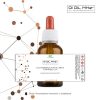
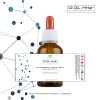







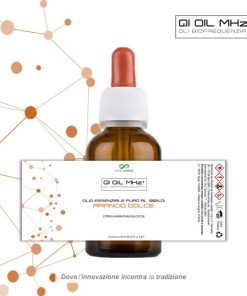
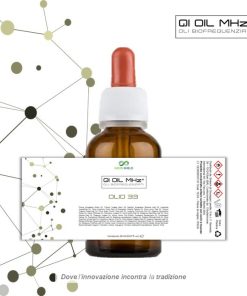
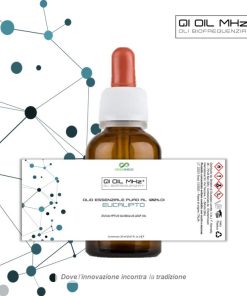
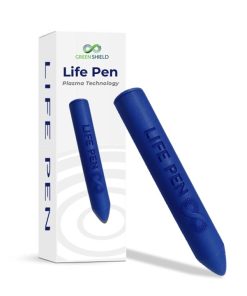
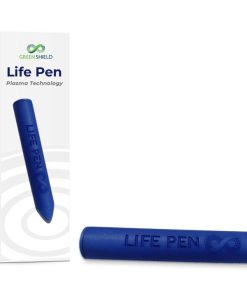




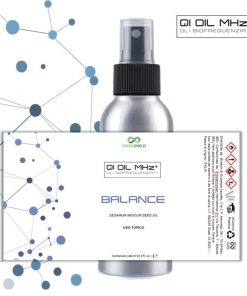
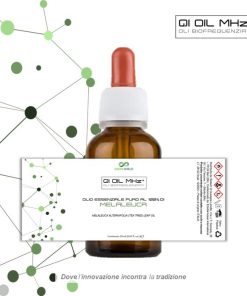
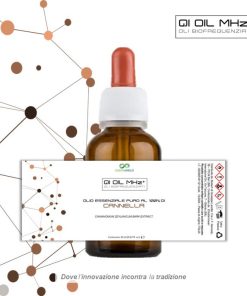
Reviews
There are no reviews yet.